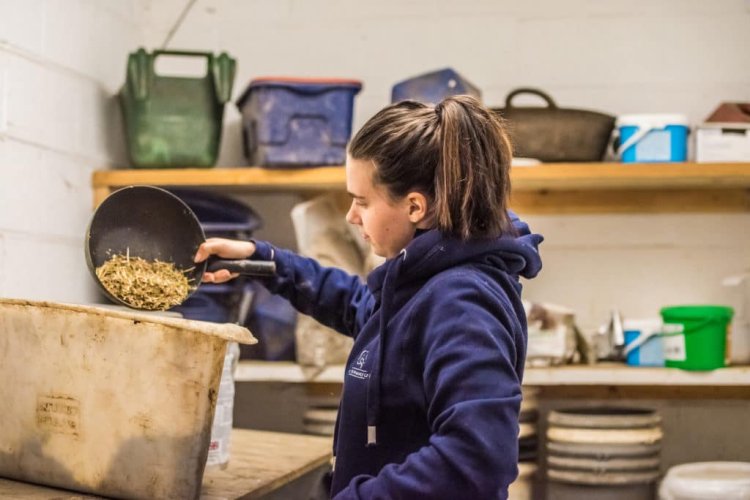in basket
Your horse: Feeding the fussy eater

Do horses prefer certain foods?
A horse’s preference for certain foods is determined by many factors such as smell, taste and texture of the food, all of which help to prevent them from eating toxic plants. Taste preference is also affected by what we call post-ingestive feedback where the horse’s digestive tract, including the liver, sends signals to the brain about what nutrients the horse requires and can then determine whether these are available in the food that the horse is eating. Horses can also assess food visually based on shape and colour as well as by smell, which enables them to recognise different foods. From what we know, it seems that horses eat when they are hungry and drink when they are thirsty, with little nutritional wisdom other than selecting high-calorie feeds. For example, if given free choice over a range of feeds they are unlikely to choose the healthiest feeds and balance their intake of nutrients. However, horses are known as selective grazers, which means they will select edible forages and avoid toxic plants.
Horses seem to prefer sweet and salty tastes. Scientists have shown that horses react differently to sweet tastes compared to bitter. Horses nod their heads, move their ears forward and lick their lips when given a sweet feed, and when given a bitter tasting feed they tend to curl up their lips, move their ears backwards and stick out their tongues. These reactions to sweet and bitter tastes are the same in many other species, including humans. There are sweet receptors on the tip of the tongue and the response to sweet tastes is licking, which moves the sweet feed into the mouth. Whereas, the bitter receptors are located towards the back of the mouth and the response to a bitter taste is to push the feedstuff back out of the mouth. The purpose of these reactions to different tastes is most likely to have evolved to help horses survive by selecting high-calorie feedstuffs (sweet tasting) over toxic plants, which often tend to taste more bitter.
Do horses need a varied diet?
As humans we have large variations in individual food preferences, some of us have a sweet tooth, whilst others may prefer salty or spicy, and like or dislike specific vegetables. Horses, however, do not tend to have the same diversity in food preference; their taste preferences are aimed principally towards intake of calories for survival. Therefore, no matter how hard you try you won’t be able to get a horse to develop a taste for sushi! Free-ranging horses will typically browse over many different forages and may consume over 50 different plant types on a daily basis. In contrast, domesticated horses are generally provided with one forage type. When offered either a single forage or a choice of several different forages, horses do appear to prefer access to multiple forage sources. It is thought that this may be because in the wild the nutritional value of a food source is constantly changing due to a whole host of environmental factors. So, it seems horses have developed the ability to select feeds based on nutritional content. By eating different types of forage throughout the year it means that wild horses can ensure energy intake is maximised by selecting the forage with the highest energy at that time of year.
Having said that, horses don’t get bored eating the same thing every day. They are not like humans, who actively seek out and enjoy new tastes, they prefer to eat what they are used to. In fact, horses do well on a relatively consistent forage-based diet, which is essential in terms of keeping their gut healthy and minimising issues, such as colic. Therefore, any changes to your horse’s diet should be done very gradually to avoid digestive upset, ideally over a period of 2 weeks.
Do horses prefer certain flavours?
We all know that our horses like carrots and that mint is frequently added to commercial feeds, but who would have thought that horses prefer fenugreek and banana to carrot and mint. Research studies have shown that horses prefer fenugreek, banana, mint, cherry, garlic, apple and carrot to other flavours such as cinnamon, vanilla and citrus. Flavours are a good way of ensuring that horses eat their supplements and manufacturers have begun to include these in their products. These flavours can also be used to mask the taste of medicines and to encourage horses to take certain medicines. For example, flavour can be used to encourage a horse to accept a deworming syringe by filling an empty syringe with apple sauce (it is better to use sugar-free if possible). Getting them used to enjoying the odd syringe of sweet apple sauce can often mean that future deworming is a less traumatic experience for your horse, and you! Flavours can also be used to increase intake in horses with a loss of appetite.
Illness can have a profound effect on appetite, which can be incredibly difficult to manage and hugely important for recovery. The use of flavours to encourage sick horses to eat is a very interesting area that has received little attention. Some work has been done in horses with chronic grass sickness, where a decrease in appetite is commonly seen, using different flavours to increase feed intake. Similarly, many horses following colic surgery also have markedly depressed appetite, with some equine hospitals seeing clear benefits in some of their patients when they added certain flavours, including ginger! However, more research is needed to establish clear evidence and guidelines for the use of flavours for different medical or post-surgical management.
How can we manage the fussy eater?
When a horse is thought to be a picky eater, the first port of call is to rule out any medical cause, for example issues with their teeth. If horses are hungry, and any medical cause has been ruled out, they should eat what is offered to them as they have evolved to take every opportunity to eat extra calories in preparation for times when food may not be as readily available. However, domesticated horses do live a very different lifestyle to that of their wild counterparts and some have become well accustomed to eating sweet feeds, making it difficult to get them to eat high fibre feeds, such as sugar beet pulp or short-chop alfalfa, particularly if they are unmolassed.
Horses fed a lot of sweet tasting feeds can come to expect an intense sweet flavour and the best way to overcome this is to very gradually replace the sweet feed with the new feedstuff. It is important to persevere as it may take a few weeks before the horse becomes accustomed to the new feed, but its survival instinct for feed intake will kick in and override the desire to eat something sweeter. Another means of overcoming picky eating is to turn the horse out to pasture and remove all supplementary feeds (where possible), although this should be done at an appropriate time and not at a time when the horse needs to be in peak condition, or the pasture is of poor nutritional quality.
If you are adding in a new supplement to your horse’s feed and your horse does not like the taste or smell of it, adding in fenugreek or banana flavouring can encourage eating, and after a while the flavouring can be gradually cut back to where it is no longer needed.
Article written for Premier Performance by Professor Jo-Anne Murray.






